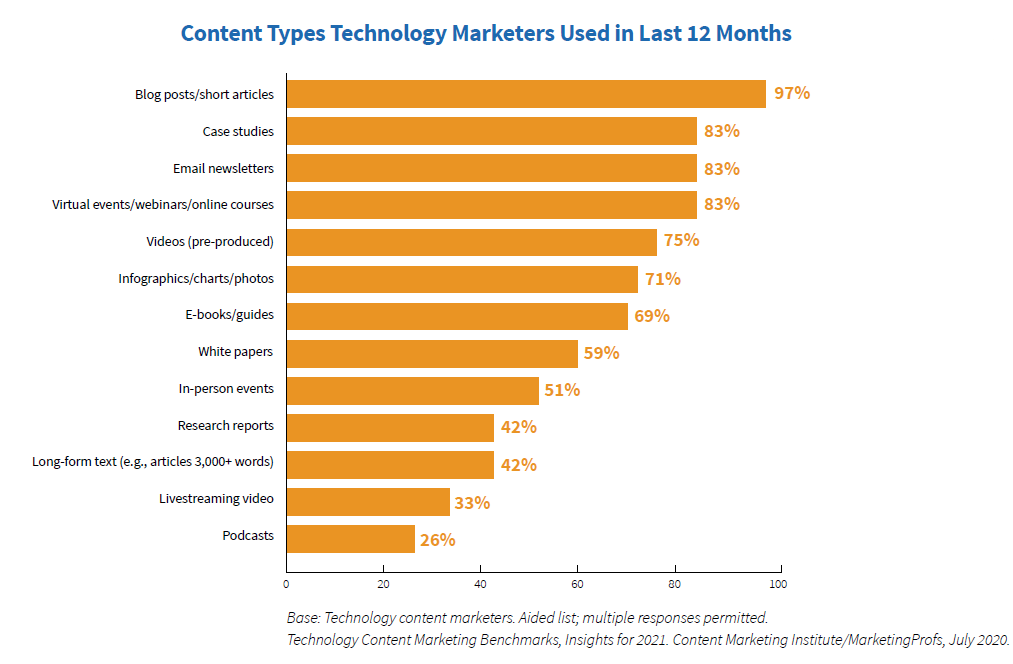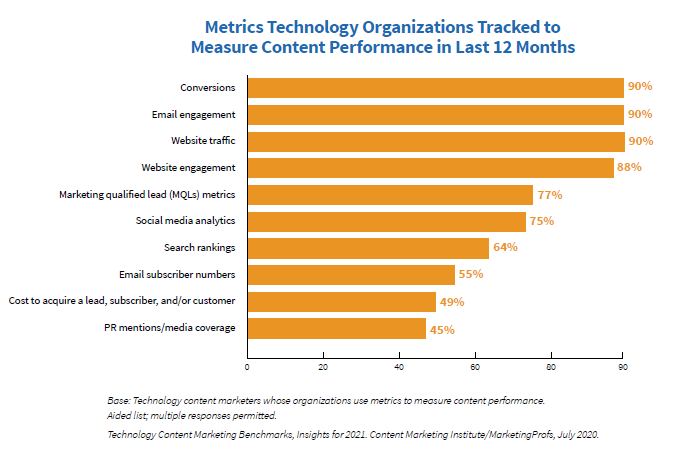Content marketing certainly proved its worth over the past year, as the pandemic caused most B2B marketers to shift to digital-first or in some cases digital-only channels. Face-to-face events pivoted en masse to a mix of webcasts, virtual conferences and digital roundtables. The inability to meet with customers in person required sales and marketing teams to increase their digital presence to engage with prospects.
These shifts, in turn, led B2B tech marketers to focus more closely on tangible metrics for measuring their content marketing investments, according to the Technology Content Marketing: Benchmarks, Budgets & Trends report, produced by the Content Marketing Institute and MarketingProfs and sponsored by IDG. Improving our ability to more directly measure return on investment for content marketing is one positive outcome of an otherwise dismal 2020.
Virtual Boost
In the spring of 2020, as businesses canceled travel and closed office locations, marketing teams were forced to pivot quickly. Attention turned to digital channels for all or most marketing activities, especially events. More than 8 in 10 technology marketers (83%) used virtual events, webinars, and online courses in 2020, up from 74% in 2019, according to the CMI study. Organizations using livestreaming increased to 33% from 13%.

At IDG, the number of custom webcasts we produced for our technology clients increased by a whopping 240% last year compared with 2019. That accelerated pace is continuing through the first part of 2021 – an early indicator that these tactical shifts may persist even when the business world returns to “normal.” In the CMI survey, 62% of technology marketers believe the pandemic will have a major or moderate impact on their organization’s content marketing success over the long term.
Tangible Metrics
The economic downturn led to belt-tightening for many businesses, and marketing was not spared. The cost-cutting certainly could have been worse, however: Just one-third of technology marketers in the CMI study said they had to decrease spending on content marketing in response to the pandemic.
A more notable shift for content marketers was a renewed focus on ROI. Conversions became a top metric, with 90% of marketers measuring conversion rates to track content performance (up from 81% the previous year). Tech marketers’ use of marketing-qualified leads also increased to 77%, up from 64% a year ago. And 86% said content marketing helped them achieve demand/lead generation goals, up from 79% in 2019.

Building Trust and Loyalty
Leads are important, but so are relationships. As business travel and in-person events remain limited, content marketing plays a critical role in helping to establish and maintain relationships with customers and prospects. Among tech marketers, 77% said content marketing helped them build credibility and trust with their audiences – up from 73% the previous year and 69% two years prior. And 63% said content marketing helped them increase loyalty with existing customers – up from 58% in 2019 and 53% two years ago.
Compelling content is a great way to engage and inform your audience, but in a digital-first environment, a vibrant online community also can play a significant role in building both credibility and loyalty. The CMI study found that 40% of tech marketers have established an online community. Among those who have not, 29% say they’re likely to launch an online community in the next 12 months. Of course, building and maintaining a vibrant online community can be a heavy lift for resource-constrained marketing teams. Another option is partnering with an established community – and becoming part of the conversation as a trusted thought leader.
Full-Funnel Support
You can see how this is playing out. Successful tech marketers are using content to establish relationships and build trust – and then nurturing those relationships to generate conversions and qualified leads for sales teams. This full-funnel approach has become more critical – and also more measurable – over the past year as the pandemic forced a sudden shift to digital-only channels among both technology buyers and sellers. In CMI’s broader, cross-industry content marketing study, 73% of top performers (those who characterize their organization’s overall content marketing approach as extremely or very successful) said they nurture subscribers, audiences, or leads, compared with 38% of less successful content marketers.
In a year unlike any other, content marketing has proven its value in helping B2B technology companies stay connected to their customers, and in delivering results to the business. The challenge, as always, is sustaining that value, with a steady stream of quality content supported by smart distribution and engaging experiences. It only takes one or two bad experiences – including content that falls flat with the intended audience – to erode credibility. It’s important to remember this stat from IDG’s 2019 Customer Engagement Study: 79% of IT decision-makers are willing to register for content if they believe they’ll receive some value in return – but just 38% of downloaded content delivers on that value promise.
A focus on metrics that matter will help technology marketers build a case to increase investments in content marketing in the year ahead. Just make sure you remain as focused on creating the high-quality content that paves the path to purchase.
Rob O’Regan is a veteran journalist and content marketer. As global content director with IDG Communications, Rob oversees content strategy for IDG’s marketing services group. Previously, Rob was founder and principal of 822 Media, a content marketing agency. He also was the founding Editor in Chief of CMO, an award-winning publication targeted at senior marketing executives. Follow him on Twitter here.







